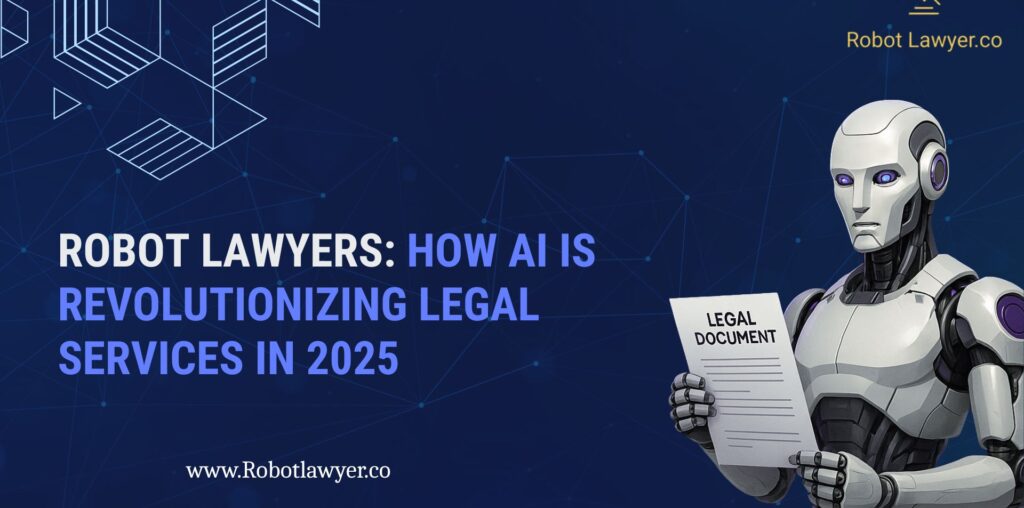Introduction to Robot Lawyers
What Are Robot Lawyers?
Imagine having a lawyer who never sleeps, never gets tired, and remembers every single legal precedent ever written. That’s a robot lawyer. These are AI-powered systems that mimic the cognitive functions of human attorneys to handle legal tasks—everything from drafting contracts to giving legal advice.
The Rise of AI in Legal Services
AI has been creeping into the legal industry for a while, but 2025 marks a tipping point. With advancements in machine learning, natural language processing (NLP), and legal database integration, robot lawyers are no longer a novelty—they’re mainstream.
Why 2025 Is a Game-Changer
This year, legal AI tools have become more affordable, scalable, and accurate. More law firms are integrating robot lawyers into their workflows, and even solo practitioners are reaping the benefits. Legal services are becoming faster, cheaper, and more accessible than ever before.
How Robot Lawyers Work
Core Technologies Behind Robot Lawyers
Robot lawyers are built on AI technologies like machine learning, NLP, and big data analytics. These tools allow them to interpret legal language, draw insights, and generate relevant documents in seconds.
AI Algorithms and Legal Databases
They’re trained on massive databases of statutes, regulations, case law, and legal journals. The more data they process, the smarter they become. Think of them as legal librarians on steroids.
Natural Language Processing in Legal Applications
NLP enables robot lawyers to understand and process human language. Whether it’s interpreting a vague clause or understanding a complex court opinion, NLP gives robot lawyers the linguistic skills of a seasoned attorney.
Key Benefits of Robot Lawyers
Cost Efficiency
Hiring a lawyer can burn a hole in your wallet. But robot lawyers can slash those costs by automating routine legal tasks, often for a fraction of the price.
Speed and Accuracy
Need a contract reviewed in five minutes flat? No problem. Robot lawyers don’t get distracted or fatigued—they deliver faster and more precise results than their human counterparts.
Accessibility and 24/7 Availability
Not everyone can afford a top-tier law firm. Robot lawyers democratize legal help, making it available to anyone with internet access, anytime they need it.
Areas Where Robot Lawyers Are Dominating
Contract Analysis and Drafting
AI can analyze contracts, spot loopholes, and even suggest improvements—all in real-time. This means businesses can finalize deals quicker and more securely.
Legal Research and Case Law Review
Gone are the days of spending hours digging through casebooks. Robot lawyers can scan millions of legal documents in seconds and pull out the most relevant cases.
Document Automation
Whether it’s NDAs, employment agreements, or wills, AI tools can create legally sound documents with just a few clicks.
Online Dispute Resolution
From small claims to consumer disputes, robot lawyers are stepping into the courtroom—virtually. Platforms now offer automated mediation and arbitration, saving time and money for everyone involved.
Human Lawyers vs. Robot Lawyers
Collaboration, Not Replacement
Let’s set the record straight: robot lawyers aren’t here to replace human lawyers—they’re here to help them. Think of them as super-efficient legal assistants.
Tasks Still Best Handled by Humans
Courtroom advocacy, emotional intelligence, and complex negotiations still need the human touch. Robot lawyers handle the grunt work; humans handle the gray areas.
Ethical Considerations in AI Legal Practice
Who’s responsible if a robot lawyer gives bad advice? The legal world is still grappling with questions about liability, transparency, and accountability in AI-powered legal services.
Real-World Examples of Robot Lawyers in 2025
Law Firms Using AI for Legal Tasks
Top firms like Latham & Watkins and Clifford Chance have integrated AI tools for research, compliance checks, and even due diligence in M&A deals.
AI-Powered Legal Platforms
Platforms like DoNotPay and RobotLawyer.co are offering affordable AI-driven legal assistance, from fighting parking tickets to drafting contracts.
Governments and AI Legal Services
Some governments are now experimenting with AI to help citizens understand their rights or appeal fines—cutting down on bureaucracy and making the legal process more transparent.
Challenges Faced by Robot Lawyers
Regulatory and Compliance Issues
Not all jurisdictions welcome robot lawyers with open arms. There are still regulatory barriers about what AI can and can’t do in the legal world.
Data Privacy and Security Concerns
Legal data is sensitive, and storing it in AI systems brings new challenges around encryption, privacy laws, and data breaches.
Bias and Fairness in AI Decisions
AI is only as good as the data it’s trained on. If that data has bias, so will the decisions. Ensuring fairness and ethical AI usage is still an ongoing battle.
The Future of Robot Lawyers
Advancements on the Horizon
Expect smarter robot lawyers that can predict case outcomes, negotiate settlements, and even provide emotional support through AI chat.
Integration with Blockchain and Smart Contracts
Blockchain is already shaking up the legal field, and when combined with AI, it allows for tamper-proof smart contracts and secure digital agreements.
Global Impact on the Legal Industry
From remote villages to global megacities, robot lawyers are closing the justice gap. Legal help is no longer a luxury—it’s becoming a digital right.
Conclusion
Robot lawyers are no longer science fiction—they’re a real, evolving part of our legal system. As AI continues to improve, so will the quality and reach of legal services. While they’ll never replace the nuanced expertise of human lawyers, robot lawyers are making legal help more accessible, affordable, and efficient than ever before. Welcome to the future of law—it’s automated, intelligent, and already here.
FAQs
1. Are robot lawyers replacing human lawyers?
Nope. Robot lawyers are tools to assist human lawyers, not replace them. They handle repetitive tasks, letting humans focus on complex, strategic legal work.
2. Can robot lawyers represent clients in court?
As of 2025, robot lawyers can’t argue cases in traditional courts. However, they’re used in virtual courtrooms and for online dispute resolution.
3. How secure is my data with AI legal services?
Most platforms use high-end encryption and comply with strict data privacy laws. Still, it’s wise to read the platform’s privacy policy before uploading documents.
4. Are robot lawyers affordable for small businesses?
Absolutely. One of their biggest advantages is cost-effectiveness. Small businesses can now access high-quality legal help without the hefty fees.
5. Where can I access robot lawyer services?
You can find robot lawyers through platforms like DoNotPay, RobotLawyer.co, and other emerging legal tech services available online.




